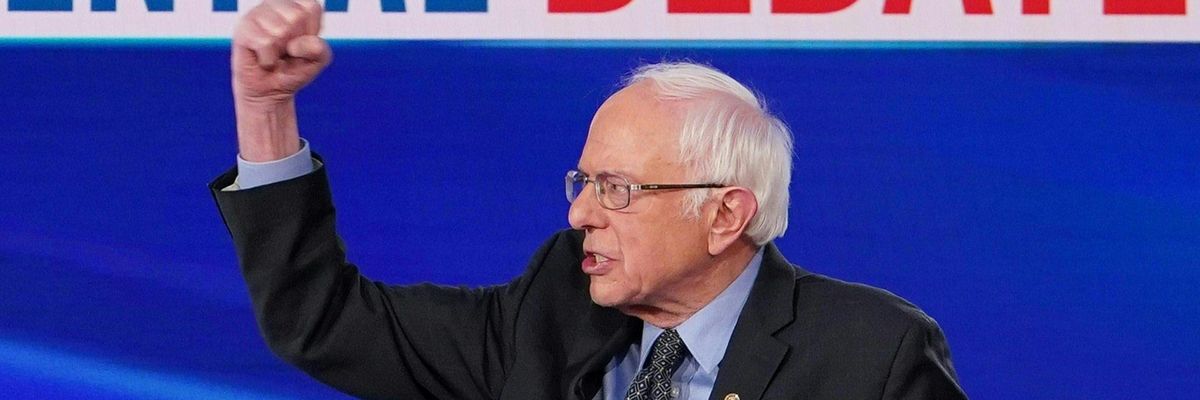The Campaign Legal Center on Wednesday filed suit against the Federal Election Commission, charging that the regulatory agency has failed to enforce the law against a group that spent millions of dollars on advertisements targeting key voters and opposing 2020 Democratic presidential primary candidate Sen. Bernie Sanders.
Though Sanders ultimately suspended his second presidential campaign and endorsed President Joe Biden, the Vermont Independent's impressive finish in the Iowa caucuses and victory in the New Hampshire Democratic primary were immediately followed by the formation of the Big Tent Project in mid-February 2020.
As the Campaign Legal Center (CLC) detailed in a statement about the suit (pdf):
Jonathan Kott, the group's executive director, stated publicly that he "started his group when Democratic donors approached him following Sanders'" early wins and that he formed the Big Tent Project "to act and make sure voters had all the information about [Sanders'] radical views before they voted."
Big Tent Project then spent millions of dollars to do just that. In a little over one month after its formation, it spent more than $4.8 million on ads expressly advocating against Sanders and targeting voters in the states whose primary elections followed New Hampshire's.
Once Sanders' path to the presidential nomination became nearly impossible, Big Tent Project's election spending dropped precipitously.
CLC filed an administrative complaint (pdf) about the Big Tent Project with the FEC in May 2020, alleging that the group--led by a former aide to conservative Democratic Sen. Joe Manchin of West Virginia--violated the Federal Election Campaign Act (FECA) by failing to register as a political committee (PAC) and disclose its contributors.
"Even if Big Tent Project were not a political committee," the 2020 complaint says, "it violated FECA by failing to disclose contributors who gave for political purposes and to fund its independent expenditures, and additionally failed to report tens of thousand s of dollars of independent expenditures."
"FECA guarantees voters' right to know which wealthy special interests are spending big money to influence our vote and our government, and Big Tent Project's unlawful shielding of those donors' identities undermined that right," adds the CLC complaint--which has not led to any FEC action since being filed over a year ago.
Erin Chlopak, director of campaign finance strategy at CLC, said Wednesday that "as the only government agency with the sole responsibility of overseeing the integrity of our federal political campaigns, the FEC's failure to protect voters' right to know who is trying to influence their votes and take action on this blatant violation is yet another example of the agency's dysfunction and its disregard for the campaign finance laws it was designed to oversee."
More broadly, Chlopak's group says that "the failure of the FEC to enforce campaign finance laws has resulted in an explosion of secret spending, and our politics are increasingly rigged in favor of special interests."
CLC is asking the U.S. district court in Washington, D.C. to declare the agency's failure to act on its complaint about the Big Tent Project "contrary to law, and order the FEC to conform within 30 days."




